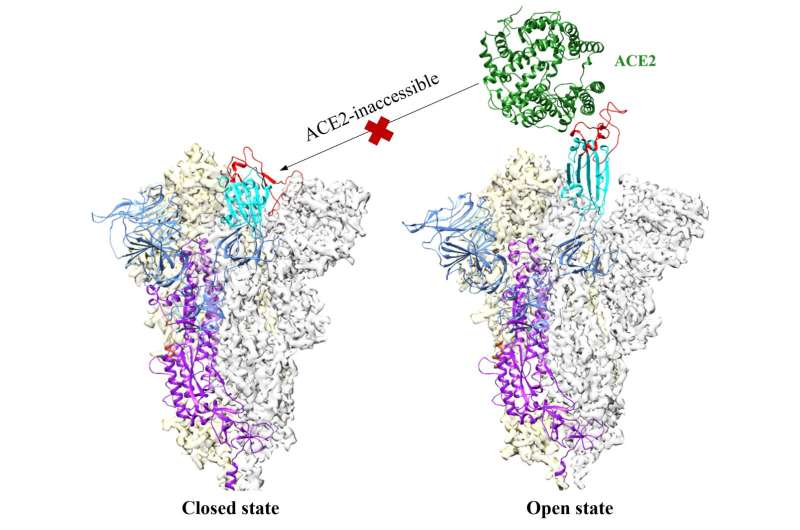This article has been reviewed according to Science X's editorial process and policies. Editors have highlighted the following attributes while ensuring the content's credibility:
fact-checked
peer-reviewed publication
trusted source
proofread
Keeping SARS-CoV-2 closed for business with small molecules

The infamous spike proteins on the surface of SARS-CoV-2 help it bind to and enter human cells. Because of their important role in spreading infection, these spike proteins are one of the main targets for COVID-19 vaccines and treatments. But those remedies gradually lose effectiveness when certain segments of the spike proteins mutate. Now, researchers report in ACS Central Science that they have discovered small molecules that successfully target other segments that mutate less.
Spike proteins change shape when they attack a cell. In their "open" structure, they expose a section known as the receptor-binding domain (RBD) so it can attach to the ACE2 protein on human cells. In the "closed" structure, this RBD segment is tucked inside the spike protein and can't bind to human cells. Antibodies contained in some COVID-19 therapies or stimulated by vaccines or infection target the RBD domain so it can't bind to ACE2. However, some emerging variants of the coronavirus contain mutations in the RBD fragment. That means vaccines and antibody therapies designed to target that fragment could become less effective as the virus mutates.
To get around this problem, other, less mutation-prone parts of the spike protein could be targeted instead. One possibility is a pocket in the spike protein that has been dubbed the Achilles' heel of the virus. When this cranny is occupied by free fatty acids (FFAs) or a few other compounds, the protein remains locked in its closed, harmless configuration. However, those compounds aren't suitable treatments because they aren't stable or they bind weakly. So, Jianhui Huang, Niu Huang and colleagues decided to look for other potential treatments that lack these flaws.
Using computer modeling, the team screened a library of small molecules, seeking ones that could slip into this pocket and stick firmly to the spike protein, keeping it in the closed shape. The researchers then used surface plasmon resonance and other techniques to evaluate analogs of these molecules for improved binding and solubility. The resulting compounds, which can bind to spike proteins from the original coronavirus as well as the omicron BA.4 variant, could serve as a starting point for developing broad-spectrum treatments for COVID-19, the team says.
More information: In Silico Discovery of Small Molecule Modulators Targeting the Achilles' Heel of SARS-CoV-2 Spike Protein, ACS Central Science (2023). DOI: 10.1021/acscentsci.2c01190
Journal information: ACS Central Science
Provided by American Chemical Society





















